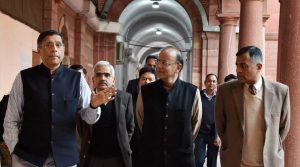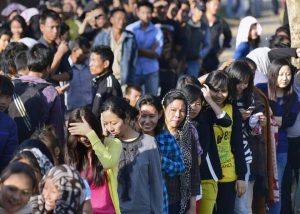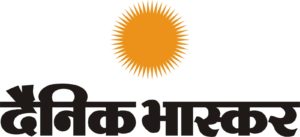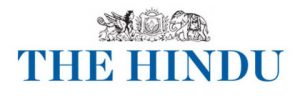
09-02-2017 (Important News Clippings)
To Download Click Here
Tackling corruption
Deal with systemic causes such as unresponsive governance and authorities’ discretionary power

It is no one’s case that corruption is benign. It is unfair to honest people and represents a hidden and unpredictable tax. But incidence of corruption is best reduced by tackling root causes. For instance, a bribe taker’s power stems from being endowed with discretionary power and an opaque structure. In India, governments with their enormous control over levers of power and distribution of humongous resources have a structure which encourages corruption. It is also important to keep in mind that redressal in this system depends on an overburdened judiciary. Hence it is not surprising to find many disputes trapped in a legal maze for years.
The outcome of this systemic flaw is that criminals-turned-politicians gain public legitimacy as people who can get things done in an otherwise unresponsive governance system. A solution, therefore, has to involve significant changes in India’s governance structure. Here, India seems to follow a trajectory which involves a step forward in one area and a step back elsewhere. For example, if natural resources are increasingly allocated through transparent auctions, other arms of government such as tax authorities are granted more discretionary power. The battle against corruption needs a more coherent and strategic approach.
To begin with, there have to be consistent moves towards reducing discretionary powers with government. Simultaneously, transparency in government operations and service delivery must be enhanced. India’s stretched judiciary must be bolstered as weak redressal encourages abuse of power by officials and regulators. The positive spinoff will be ease of carrying out any kind of economic activity. The push towards greater cash transfer must continue. Once people are assured of their rights, the need to pay a bribe will disappear.
Enough of Poll-Vaulting
Demonetisation, with its mixed impact on the economy and immediate dislocation of lives, marked the last months of last year. In the first few days of the new year, two events happened that could strengthen India’s democratic governance.First, the Supreme Court judgement, interpreting Section 123(3) of the Representation of the People Act 1957 as amended in 1961, and deeming it a ‘corrupt practice’ for candidates to canvass votes along religious, communal or caste lines. Second, the announcement of Prime Minister Narendra Modi to focus on bringing transparency in election funding.
It has been well known that election funding is a murky affair. That political parties collect huge sums of money, mostly unaccounted for — from unknown sources through dubious means, especially during elections — is generally accepted. There are no reliable estimates of the quantum of funds collected on behalf of parties or candidates, or the amount of money that goes into the electoral process. However, it is presumed that the BJP and the Congress are the major culprits and beneficiaries of this corrosive practice that they themselves decry from every possible pulpit.
Funding of elections is, indeed, the mother of black money. Neither the Central Vigilance Commission (CVC) nor the Central Bureau of Investigation (CBI) can effectively curb corruption under the current political culture, administrative structure and legal framework. Corruption and poll-funding are inseparable twins.Even though fighting parliamentary and state elections has become very expensive, the Election Commission (EC) and the political parties refuse to accept and act on the reality. Ridiculously low levels of election expenses far below the actuals are permitted. Consequently, the very first act of an elected MP or MLA is to sign a patently false statement of his election expenses. Very ingenious ways are found to fabricate the statements by our putative lawmakers.
To ensure transparency and fair practice, the loopholes in the system can be plugged and each and every item of election expenses of a candidate can be listed and audited by a designated chartered accountant that can be submitted within a prescribed time to the EC for scrutiny. Candidates and auditors found guilty can be punished according to the law. But these are still in the realm of theory.
The EC, on its part, should revisit its prescribed limits of election expenses for contesting elections — constituencywise, if feasible, or at least state-wise in order — to evolve realistic limits. This process could be accomplished in consultation with the parties and with the Institute of Chartered Accountants of India, as many of its members help candidates in filing their election expense statements.Political parties should give up their resistance to transparency in their functioning. They should agree to be inc- luded within the ambit of the Right to Information Act instead of obstinately waiting for a Supreme Court diktat.
The government should set up a group consisting of a representative from each of the recognised political parties, with the Chief Election Commissioner (CEC) and the chairman of the Law Commission to comprehensively study issues relating to funding of elections and come up with its recommendations within a period of, say, three months. The CEC may be the member convener and his office may function as the secretariat.
The recommendations submitted for consideration of GoI may be put out in the public domain. The EC may also officially circulate the recommendations to all state governments and recognised political parties seeking their comments within a month. The comments and suggestions on the recommendations may be jointly examined by the EC and the Law Commission. Together, they could submit the draft of the comprehensive legislative measures to deal with the multifaceted issue of election funding.
The government, at the highest level, may hold appropriate consultations with the leaders of political parties to forge general consensus at the political level. Then it could introduce the proposed legislative measures in Parliament. The whole process could be completed within six months, given the political will. What matters is the timebound implementation of the intent to usher in transparency in poll funding. The mood of the country in the wake of demonetisation, the declared commitment of the prime minister, and the gradual realisation of political parties and their leaders that our electorate is becoming more and more conscious of how polls are fought and won, together could generate enough pressure on the political establishment to ensure reforming election funding that is rooted in black money. Would-be innovators need to break free of preexisting views. Unfortunately, the human mind is surprisingly adroit at supporting its deep-seated ways of viewing the world while sifting out evidence to the contrary. Academic research shows that even when presented with overwhelming facts, many people (including welleducated ones) won’t abandon their deeply held opinions.The antidote is personal experience: seeing and experiencing something first-hand can shake people up in ways that abstract discussions around conference room tables can’t. It’s, therefore, extremely valuable to start creativity-building exercises or idea generation efforts outside the office, by engineering personal experiences that directly confront the participants’ implicit or explicit assumptions.…
Exploring deep-rooted company (or even industry) orthodoxies is another way to jolt yourbrainoutof thefamiliarin an idea generation session, a team meeting or simply a contemplative moment alone at your desk. All organisations have conventional wisdom about ‘the way we do things’, unchallenged assumptions about what customers want, or supposedly essential elements of strategy that are rarely, if ever, questioned.Another simple tactic you can use to encourage creativity is to impose artificial constraints on your business model. This move injects some much-needed ‘stark necessity’ into an otherwise low-risk exercise.
T K A NairThe writer is former principal secretary to former PM Manmohan Singh.
न्यायपालिका के आंतरिक संकट से विवाद का खतरा
Date:09-02-17
बाजार भरोसे खेती से आय दोगुनी नहीं होगी
गहन सुधार दिलाएंगे निवेश को रफ्तार
अगर निवेश को गति प्रदान करनी है तो गहन ढांचागत सुधारों के अलावा कोई अन्य विकल्प नहीं है। इस संबंध में विस्तार से जानकारी दे रहे हैं अजय शाह
Undermining Welfare
Universal Basic Income can’t be a substitute for the PDS

The greatest impact of the PDS is it provides cheap food to the vulnerable. Calculations from NSS 2011-12 data show that, on an average, food from the PDS contributes over 600 calories and 15 grams of protein per head to the daily intake of beneficiary households. This satisfies 28 per cent and 31 per cent of average per capita daily calorie and protein requirements. Despite leakages, the PDS enables an additional 14 per cent households, over 130 million people, to be calorie sufficient. Given India’s persistent under-nutrition, the real question is if UBI will be able to achieve even these modest outcomes if it replaces the PDS.
The PDS provides an implicit saving — the extra expenditure a household would incur if PDS food items are bought from markets. This implicit saving is spent on other items as per the household’s choice. Hence, consumer freedom is present in both PDS provisioning and UBI. People buy from the PDS according to the degree of needs, hence purchase is skewed. The National Sample Survey (NSS) 2011-12 data shows that while the average per head implicit saving for the PDS beneficiary household was Rs 960 (assuming that market prices would not increase if the PDS is dismantled), for 25 per cent of households, the savings would be Rs 1,200 or more. But a calculation based on budget data indicates that if cash transfers are made to PDS beneficiaries of the same year from the central food subsidy after dismantling the PDS, it would not be more than Rs 1,200 per head (assuming no leakages). This amount is grossly inadequate. Rough calculations indicate that cash transfers have to be at least Rs 2,200 per head to compensate all beneficiary households.
These estimates are close to a successful cash transfer study (UNDP-Government of Delhi 2011) which compensated BPL households with Rs 1,000 monthly per family, or Rs 2,400 per head annually (assuming a five-member family) for giving up access to the PDS. Given market imperfections, supply-side factors and the need for state support that is not uniform, the PDS even at its current level of leakages is fiscally more efficient than cash transfer. Additionally, considering the declining leakages and the possibility of leakages in UBI too, its case for replacing the PDS becomes even weaker. Logically, steps must be taken to further reduce leakages in the PDS by expanding its reach and also include other food items, at least pulses, in the basket.A major lacunae of the ES is that it makes no comparative analysis of food-versus-cash interventions, even while citing such experiments. The only Indian experience the ES examines in detail is a 2011-12 UNICEF-SEWA Bharat experiment in Madhya Pradesh. However, cash transfers there were in addition to existing social welfare programmes. The ES also forgets that the cash transfer amount was increased by 50 per cent after a year to compensate for inflation.
The ES estimates that a UBI, not as replacement but in addition to the existing welfare schemes, amounting to 4-5 per cent of GDP will virtually eliminate “poverty”; the “non-poor” being those spending more than Rs 42 daily in 2016-17 as per Tendulkar Committee projections. Without going into the problems of this definition of poverty, what concerns us is the claim that follows: “Not accounting for replacement would still not seriously affect” these estimates. This claim will hold only if the existing programmes have zero contribution to welfare.
The primary goal of the ES proposal on UBI seems neither to improve peoples’ well-being, nor reduce leakages of welfare schemes. The real agenda seems to limit or even reduce welfare expenditures.
Pride as well as prejudice
The tribal bodies’ protest against reservation for women in local municipalities in Nagaland must not be allowed to settle the argument

Spearheaded by the Naga Mothers’ Association (NMA), Naga women filed a writ petition challenging the State government’s refusal to hold municipal elections before the Kohima Bench of the Gauhati High Court on June 26, 2011. In October 2011, a single-judge bench of the court upheld the Naga women’s petition and directed the government to hold elections to municipal councils and town councils on or before January 20, 2012. But before the deadline, the Nagaland government filed an appeal before a Division Bench of the Gauhati High Court, which stayed the previous ruling. One of the arguments put forward by the Nagaland government was the claim that implementing such a law would ‘upset the peace’ in Nagaland. On September 22, 2012, the Nagaland State Assembly adopted a resolution rejecting women’s reservation in ULBs on the ground that it infringes on the social and customary practices of the Nagas, which Article 371(A) safeguards.
The Joint Action Committee on Women Reservation (JACWR) then moved a Special Leave Petition in the Supreme Court in September 2012. On April 20, 2016, the Supreme Court upheld the single-judge ruling of the Gauhati High Court of October 2011. So, the Nagaland government enacted the Nagaland Municipal (Third Amendment) Bill 2016, which revoked the September 2012 resolution, paving the way for women’s reservation in ULBs. Early in January, the State government announced that elections to the ULBs would be held on February 1.
Tribal threats
The tribal bodies protested loudly as soon as the elections were announced and threatened candidates who intended to file nominations that they would be ex-communicated from their respective tribes. Coming under pressure, some candidates didn’t file nominations and some others withdrew their papers. Those who refused to withdraw from the fray were ex-communicated, ranging from 10 to 30 years.Through all this, the State government remained a silent spectator and failed to assert the rule of law, especially because these tribal bodies are not traditional institutions recognised by Article 371(A). The ULBs too are not traditional Naga institutions but constitutional bodies under Part IX of the Constitution over which Naga traditional bodies have no mandate.
When the State government refused to call off the elections, the tribal bodies announced a bandh from January 28 to February 1. They enforced the bandh across Nagaland although elections took place in several places on February 1. Clearly, some towns did not agree with these tribal bodies.
Meanwhile, on January 31, two persons were killed in Dimapur, the commercial capital of the State. Things soon took an ugly turn, and the Nagaland government declared the elections ‘null and void’. Since then, tribal bodies have begun clamouring for more, seeking the resignation of the Chief Minister, no less. Though life is limping back to normal, there is still a bandh on government offices and a restriction on movement of government vehicles.But it must be said that even before the bandh call, the focus had started shifting from women’s reservation to issues of taxes and land ownership contained in the Nagaland Municipal (Third Amendment) Bill 2016.
Unconstitutional demand
What is even more alarming, and preposterous, is that the Nagaland government has decided to write to the Centre demanding that Nagaland be exempted from Part IX A of the Constitution. “If the State Government and all the stakeholders cannot arrive at an amicable resolution of this issue at the earliest, the best option appears to be to seek exemption of Nagaland from Part IX A of the Constitution, which contains a mandatory provision under Article 243T for 33% women reservation in ULBs, which will put to rest the issue and avoid further misunderstanding among the people,” the Chief Minister’s office explained in a release.
Clearly, to rescue itself, the Nagaland government is doing a Pontius Pilate by washing its hands of the reservation issue and sacrificing the rights of Naga women at the altar of Naga males’ primeval tribal ego. If Nagaland is exempted from the purview of Part IX of the Constitution, Naga women will have absolutely no hope of entering into and participating in decision-making bodies.
Reservation for women is necessary in patriarchal societies like Naga society, for instance, where there is a historical culture of inequalities even though Nagas don’t practise sati, female foeticide and infanticide, and do not believe in dowry or the caste system. But Naga customs, culture and traditions preclude women from inheriting land and participating in the decision-making process, which is exactly what Article 371(A) protects.
The other deeply worrying issue is that because the government at the Centre appears to be misinformed about ground realities in Nagaland, it is possible that the State government’s claim that the reservation issue may ‘upset the peace’ in the state could cloud its judgment.Undeniably, the constitutionally guaranteed rights of Naga women now depend on the Centre, as much as on the gender sensitised public of India.
Monalisa Changkija is a journalist, poet and editor of Nagaland Page.




